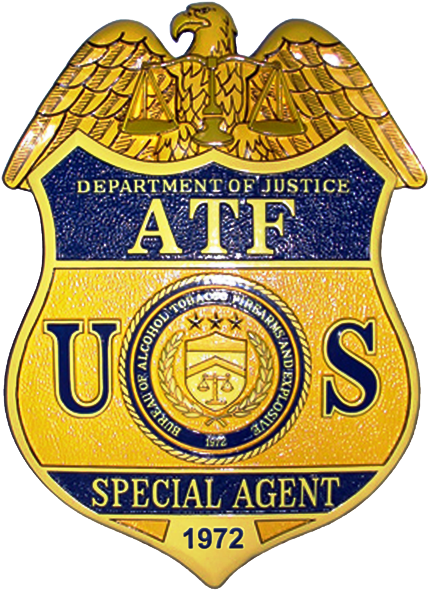(UPDATED MARCH 24, 2014)
LOS ANGELES — In dismissing a federal indictment, a federal judge torched the Bureau of Alcohol Tobacco Firearms and Explosives over how the agency conducted a string operation.
U.S. District Court Judge Otis Wright said in his ruling issued this month that ATF ‘s string operation went too far, “ensnaring chronically unemployed individuals from poverty-ridden areas in this fake drug stash-house robberies.”
“In this case, the Constitution will not tolerate subjecting an individual to prosecution for an imaginary crime subject to a very real punishment — a punishment which rests entirely on AFT agents’ whims,” wrote Wright as part of a 24-page order granting the dismissal for “outrageous government conduct.”
Wright dismissed the indictment against defendant Antuan Duane Dunlap.
“Society does not win when the Government stoops to the same level as the defendants it seeks to prosecute — especially when the Government has acted solely to achieve a conviction for a made-up crime,” Wright wrote.
Adding, “Zero. That’s the amount of drugs that the Government has taken off the streets as the result of this case and hundreds of fake stash-house cases around the country. That’s the problem with creating crime: the Government is not making the country any safer or reducing the actual flow of drugs. But for the government’s action, the fake stash house would still be fake, the nonexistent drugs would still be nonexistent, and the fictional armed guards would still be fictional.”
Tom Mrozek, spokesman for the U.S. Justice Department declined to comment Sunday. But he did say that the Justice Department has filed a notice of appeal.
In its motion filed Feb. 10 opposing the dismissal, federal prosecutors argue that the defendant’s “attacks on the investigation and prosecution” have no merit.
Citing the U.S. Ninth Circuit Court of Appeals most recent case on this matter, which is U.S. vs. Black, prosecutors maintain that they followed the law.
Both Judge Wright and the prosecutors cited the U.S. vs. Black case, which the federal appeals issued its ruling last year.
Also they said that the burden of establishing “outrageous conduct” is an “extremely high standard,” prosecutors wrote.
Adding that there is no evidence that the federal agents conduct was outrageous, noting that co-defendant Cedrick Hudson initiated the contact as to whether a police confidential informant knew of any good “come ups.”
The federal agent told the defendants including Dunlap that they “could simply walk away if they did not want to proceed with the robbery,” prosecutors stated.
On February 25, 2013, the Grand Jury indicted Dunlap and the other defendants for various crimes including conspiracy to possess cocaine with intent to distribute, conspiracy to commit robbery and possessing a firearm.
On January 28, 2014, Dunlap moved to dismiss the indictment due to outrageous government conduct. The Government opposed Dunlap’s motion.
According to court documents, this is what happened:
To catch individuals suspected of engaging in home-invasion robberies, ATF Special Agent Dan Thompson masqueraded as a “cocaine courier who wishes to steal the cocaine he is expected to deliver” from a location in the Los Angeles area, according to Wright.
The judge stated that Thompson, consistent with previous ATF reverse-sting operations, paints a picture of an all-too-easy stash-house robbery. He tells unwitting individuals a tale of bountiful harvests of 20 to 25 kilograms of “pure” cocaine being guarded by just a few individuals.
The only problem: it’s all a lie, the judge states.
Special Agent Thompson’s interaction with Defendants began around November 2012 when Los Angeles Police Department Task Force Officer Erik Shear informed ATF Special Agent Jason Moore that Defendant Cedrick Marquet Hudson had asked a confidential informant or CI whether he knew of any good “come ups.”
Judge Asks Federal Prosecutors About Term “Come Ups” During Dunlap’s Hearing
At the hearing on the motion to dismiss, the judge questioned the federal prosecutors whether the term “come ups” refers only to robbery opportunities. Prosecutors indicated that Moore and Thompson knew that Hudson meant robbery opportunities based on the context—whatever it was, the judge stated.
It still remains a mystery how “come ups” only referred to robberies here—let alone a stash-house robbery, the judge wrote.
Further, the judge noted that Moore did not provide any background regarding the CI’s interaction with Hudson; rather, Moore’s recollection starts with “the appearance” that Hudson approached the CI out of the blue.
Meeting Setup Between ATF and Defendants
After the CI contacted the ATF, the agents told the CI to tell defendants that Special Agent Thompson wanted to meet with them, according to the court documents.
On December 20, 2012, the undercover agent met with defendants Hudson and Joseph Cornell Whitfield at a restaurant in Gardena, California.
The undercover agent explained the proposed robbery to Hudson and Whitfield and told them to let him know if they were not interested. The undercover agent described the scheme as “a once in a lifetime type thing. . . . [L]ike this is like the one. You know, the come up don’t come around that often . . . .”
Thompson said that he picks up two kilograms of cocaine from the nonexistent stash house, but he always sees 20 to 25 kilograms there. The undercover agent also asked if Hudson and Whitfield if they had “a crew . . . a couple other homies” that could participate in the nonexistent robbery.
Special Agent Thompson further explained that there were usually two individuals guarding the fake stash house—one of which always carried a firearm. Special Agent Thompson said that he usually picked up cocaine once a month and that he would find out two days before the pick-up where the imaginary stash house was located.
The undercover agent proposed that he would be inside the nonexistent stash house during the robbery. He said that Hudson and Whitfield should empty his pockets and tie him up to make it look like the agent was also a victim.
Special Agent Thompson asked if Hudson and Whitfield’s associates “could handle it if something happened during the robbery (referring to someone getting shot).”
They said that they could. Thompson then stated that he had “a home girl like got a hook up at a rental car company” and volunteered to procure a getaway car and safe house. The undercover agent alluringly described the fictitious cocaine as “pure” and told Hudson and Whitfield that they would need to repackage it before distributing it.
In January, A Second Meeting Set up Defendants
On January 10, 2013, the undercover agent, Hudson, Whitfield, and the CI met for a second time outside a coffee shop in Carson, California. Special Agent Thompson stated that the cocaine shipment would arrive later in the month.
He also asked about the third member of the group, and Hudson and Whitfield said he—“Rowdy” or “Baby Rowdy”—was ready. Later in the meeting, Special Agent Thompson again said he wanted to meet him.
The undercover agent then told Hudson and Whitfield that the fictional drug traffickers would be guarding 20 to 25 kilograms of pure cocaine. The group discussed the logistics of the robbery, including how Special Agent Thompson should leave the stash-house door unlocked. Special Agent Thompson inquired if Hudson and Whitfield “could get him anything (referring to a firearm)”. Whitfield said that he could.
On January 21, 2013, the undercover agent informed Hudson via telephone that the drug traffickers were in Mexico and that the cocaine shipment would arrive in early February. Hudson said that they were ready.
On January 30, 2013, Special Agent Thompson called Hudson to arrange a meeting with the third member of Hudson and Whitfield’s crew at an undercover warehouse in Los Angeles, California. Hudson and Whitfield arrived and introduced Antuan Dunlap—a completely different person from the previously referenced “Rowdy” or “Baby Rowdy.”
The group then further discussed the details of the fake stash-house robbery.
The undercover agent Thompson again asked Whitfield if he could get him a little “strap,” meaning a gun, and the agent said that he could pay Whitfield for it. Whitfield obliged.
Hudson bragged to Thompson that Dunlap is a “jack-boy” and “robs banks and all that shit.” Dunlap also stated that he had robbed a Western Union by threatening an employee with a Taser and had robbed a Nix check-cashing establishment. But at no point did Dunlap or the other defendants indicate that they had previously engaged in home invasions or drug stash-house robberies.
In February 2013, ATF Meet a Third Time with Defendants
On February 5, 2013, Special Agent Thompson again met with Hudson, Whitfield, Dunlap, and the CI at an undercover warehouse that was to serve as the safe house—a safe house provided by the Government.
The undercover agent had rented a minivan as a getaway vehicle. Hudson placed a rifle bag from his vehicle into the rental van. The bag contained a shotgun and revolver.
While the crew waited in a break room, Special Agent Thompson told them that they were “about to get these birds (meaning kilograms of cocaine)” and described the cocaine as “‘pure[,] pure ass coca . . . this ain’t like no bullshit cocaine, [sic] this is like cocaina.’”
The agent then left the room, and Defendants were arrested.
Wright stated that not once did the ATF agents suspect any of the defendants of being involved in the home-invasion robberies.
“At best, the ATF operated off a hunch that Dunlap and the others were up to no good. But something more is required before the Government can ensnare individuals in an all-too-tempting, made-up robbery and take 15-plus years away from their lives,” the judge stated.
The Judge Questions the Value of the Federal Government Prosecuting “Fake Crime”
Citing a quote from another federal judge, Michael Ponsor, Wright questioned the merits of prosecuting “fake crime,” noting that the U.S. locks up more people than any other country in the world.
“When the nation imprisons people solely because Government dreams up a too-good-to-turn-down robbery and then targets people it knows are eager to make an easy buck, the Judge (Michael) Ponsor’s concerns are only further borne out,” Wright wrote.
“The United States Supreme Court has drawn the line between infiltrating an ongoing enterprise on one hand and manufacturing crime on the other,” Wright pointed out.
Wright also stated that there was no evidence that Dunlap was involved in home-invasion robberies or other crimes he bragged to agents about , noting also his minimal involvement in the sting operation. Also an ATF agent “goaded” one of the defendants to get him weapons, the judge said in his decision.
In its report, USA Today stated that the number of ATF sting operations has quadrupled in the past 10 years.
“So the Government essentially admits that this ruse is not meant to simply skim off those individuals likely to commit similar crimes; rather, it is designed to never fail. And the high number of fake stash-house convictions the Government has attained confirms this strategy,” Wright noted in his order.
Stating, that law enforcement is a difficult task as people will always find ways to avoid being arrested.
“But is is not the role of the Judicial Branch to merely rubber stamp whatever imaginative device the ATF and other agencies dream up,” Wright stated.
Wright was nominated to the federal bench by President George Bush in 2007.


